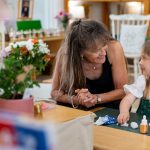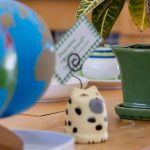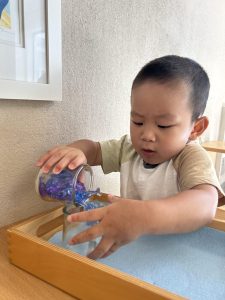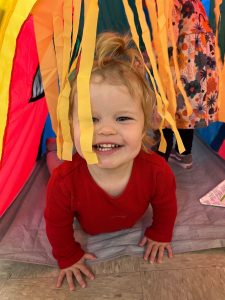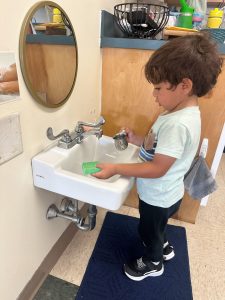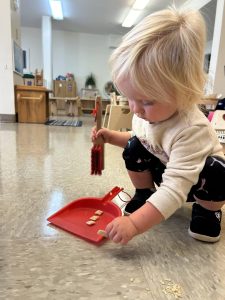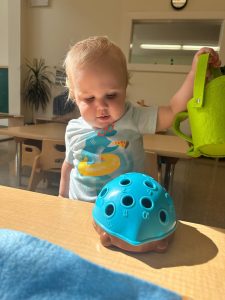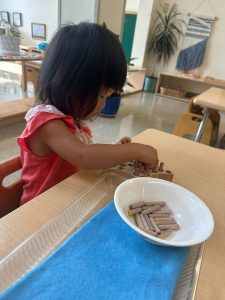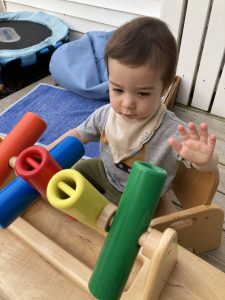Children ages 15 months – 3 years
A nurturing environment where children gain skills and discover independence, confidence, and a lifelong love of learning
Welcome to Cobb School Montessori’s Young Children’s Community (YCC), where children begin their Montessori journey and build the foundational skills that will support their growth in later stages of education, including:
- Practical Life Skills includes personal skills in dressing and undressing, tying shoes, toileting, and hand washing; care for the environment through watering plants, tending the garden, scrubbing tables, wood polishing, cloth washing, sweeping, flower arranging, food preparation and table setting.
- Control of Movement and Hand-Eye Coordination is developed through carrying exercises, spooning, pouring, folding, use of delicate materials like glass, and navigating the environment.
- Language is fostered through modeling conversation, rhymes, poems, stories, sound games, and vocabulary work.
- Art & Music is supported in the classroom with coloring, painting, pasting, cutting, musical instruments and molding work. Artwork and composers are featured from around the world.
Program Details
Cobb Montessori YCC is 5 days per week either half-day or full-day.
Half-Day: 8:15am – 11:45am | Full Day: 8:15am – 3:15pm
Typical YCC Classroom Routine
| 8:15 to 8:30 am | Arrival |
| 8:30 to 11:00 am | Work Cycle |
| 11:00 to 11:45 am | Recess |
| 11:45 am | Half Day Dismissal |
| 11:45 to 12:15 pm | Lunch and Nap Set-up |
| 12:15 to 1:00 pm | Community Lunch |
| 1:00 to 3:00 pm | Nap |
| 3:00 to 3:15 pm | Prepare for Home |
| 3:15 pm | Full Day Dismissal |
The growth we saw in our son when he moved from a daycare to a YCC classroom was astounding. His actions became much more intentional and deliberate. He learned to take care of himself and his surroundings with pride, and his confidence grew tremendously. The nurturing and purposeful environment made a noticeable difference in his ability to focus, communicate, and explore independently. We couldn’t be happier with our decision to join YCC.
– Former Parent
“The child has a mind able to absorb knowledge.
He has the power to teach himself.”
The Unconscious Absorbent Mind: Dr. Montessori viewed the period from birth to age 6 as the “first plane of development,” a time of intense, foundational growth. Children in this age range, especially from 0-3, are in what Montessori called the “unconscious absorbent mind” phase, where they absorb information effortlessly and unconsciously from their surroundings. During this period, children have a heightened sensitivity for learning specific skills such as movement, language, and order. She believed developing independence at this age was critical, as children are driven to do things on their own. Our YCC Guides support self-formation and exploration giving children freedom within a prepared environment that emphasizes the importance of movement and exploration in understanding the world.
YCC FAQ
Community is at the heart of a YCC classroom. The strength of our community fosters a deep sense of belonging and collaboration among the children. The mixed age classroom encourages empathy and allows younger children to learn through the modeled behaviors of older children. Throughout the year, YCC classrooms observe celebrations from cultures around the world and prioritize inclusion to lay the foundation for understanding, respect, and an appreciation of diversity.
Frequently Asked Questions
If you’re considering Cobb’s YCC program, we encourage you to schedule a tour. Each tour is personalized based on your family’s questions and circumstances. Below are some frequently asked questions to review before your tour.
Why Montessori for Toddlers?
In the earliest years of life, children go through an incredible period of growth and development, laying the foundation for their personalities, learning abilities, and social skills. The Montessori approach is uniquely suited to support toddlers during this transformative stage by creating a nurturing, intentional environment where they can explore freely and develop essential life skills. In a Montessori classroom, toddlers are encouraged to take on simple tasks, like pouring water or tidying up, which fosters independence and confidence from an early age. These practical life activities also teach respect for themselves, others, and their surroundings. Through guided interactions, toddlers learn to express themselves, listen to others, and build empathy—skills that are invaluable as they grow. Montessori’s focus on individualized learning allows each child to progress at their own pace, celebrating their unique journey while fostering a love for learning that can last a lifetime. By choosing Montessori for your toddler, you are giving them a head start on self-confidence, independence, and the skills to thrive in a community.
How does the YCC program support social development?
Social development is a core part of the YCC experience. Children learn to interact respectfully with their peers through guided activities and modeling from adults. Simple tasks like sharing materials, taking turns, and engaging in small group activities help toddlers understand empathy, cooperation, and respect for others.
What if my child has separation anxiety?
Separation anxiety is a common phase for young children, and we have a gentle approach to help them feel comfortable in their new environment. Our guides work closely with parents to create smooth individualized transition plans, which may involve shorter initial days or a “goodbye” routine. With time and consistency, most children adjust and feel at ease in the classroom.
What are the requirements for my child to enter the Young Children’s Community?
Our YCC program is designed for children ages 15 months to 3 years who is able to walk steadily and carry a work tray. Each child is unique, so we encourage an initial meeting to discuss your child’s readiness and to answer any questions about starting their Montessori journey.
Is potty training required for enrollment in YCC?
No, potty training is not a requirement for joining the YCC. In fact, our guides work closely with parents to support children in this important milestone. Our classrooms are designed to foster independence in all aspects of self-care, including toileting, so children gain confidence and autonomy as they grow. Each room is equipped with child-size toilets and sinks to help support potty-training.
How do you communicate with parents about their child’s progress?
We believe in maintaining open communication with parents. Our guides regularly share observations and updates on a child’s growth and development. Additionally, we offer parent-teacher conferences, observations, and opportunities to share information during pick-up.
What does a typical day in the YCC classroom look like?
Each day follows a consistent rhythm, which helps young children feel secure and understand what to expect. The day includes a blend of individual work time, group activities, snack time, outdoor exploration, and time for caring for the classroom environment. Children move at their own pace, choosing activities that align with their interests and developmental stage, guided gently by our experienced Montessori educators.
What is the application process for YCC?
To begin the process, we encourage you to schedule a visit to tour our school. This gives you an opportunity to see our environment and ask any questions you may have. From there, you’ll complete an application, and we’ll work together to determine the best start date for your child.
YCC is more than daycare
At Cobb, we do more than simply watch over your child. Our Montessori-based Young Children’s Community fosters independence, curiosity, and a life-long love of learning from the very start. Unlike a typical daycare where the main goal is supervision, our certified Montessori Guides create a carefully prepared environment that encourages self-directed exploration and hands-on discovery. By balancing freedom and structure, each child develops critical thinking skills, executive function, decision-making, confidence, and a genuine enthusiasm for learning.
While Montessori represents a higher investment, the return is immeasurable: children gain not only academic readiness but also social-emotional growth, problem-solving abilities, and a solid foundation for future success. At Cobb you’re choosing more than childcare…you’re choosing an enriched, nurturing experience that empowers children to thrive now and in the years to come.
Meet Our YCC Montessori Guides
Our guides in the Young Children’s Community are experienced, Montessori-trained educators who are deeply committed to nurturing each child’s natural curiosity, independence, and joy in learning. With warmth, patience, and a profound respect for young minds, our guides create a safe and supportive environment where children feel valued and empowered to explore. They observe each child’s unique needs and interests, gently guiding them through new discoveries and skills, while fostering a strong foundation for lifelong learning and confidence.
What is the role of a Montessori guide in the YCC classroom?
Montessori guides in the YCC are trained to observe and gently guide each child based on their individual needs and interests. Rather than directly instructing, guides provide the right materials, guidance, and support to help each child explore, learn, and develop at their own pace, always in a warm, nurturing manner that respects each child’s uniqueness.

Jamie Gilbert

Judy Maloney

Sheryl MacInnis
YCC Classrooms
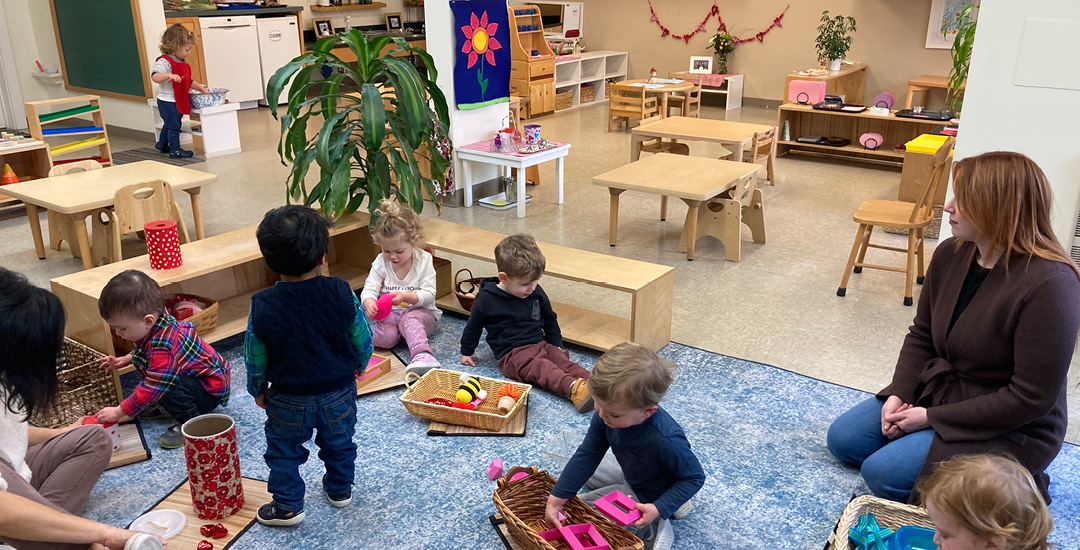
"The environment must be rich in motives which lend interest to activity and invite the child to conduct his own experiences.”
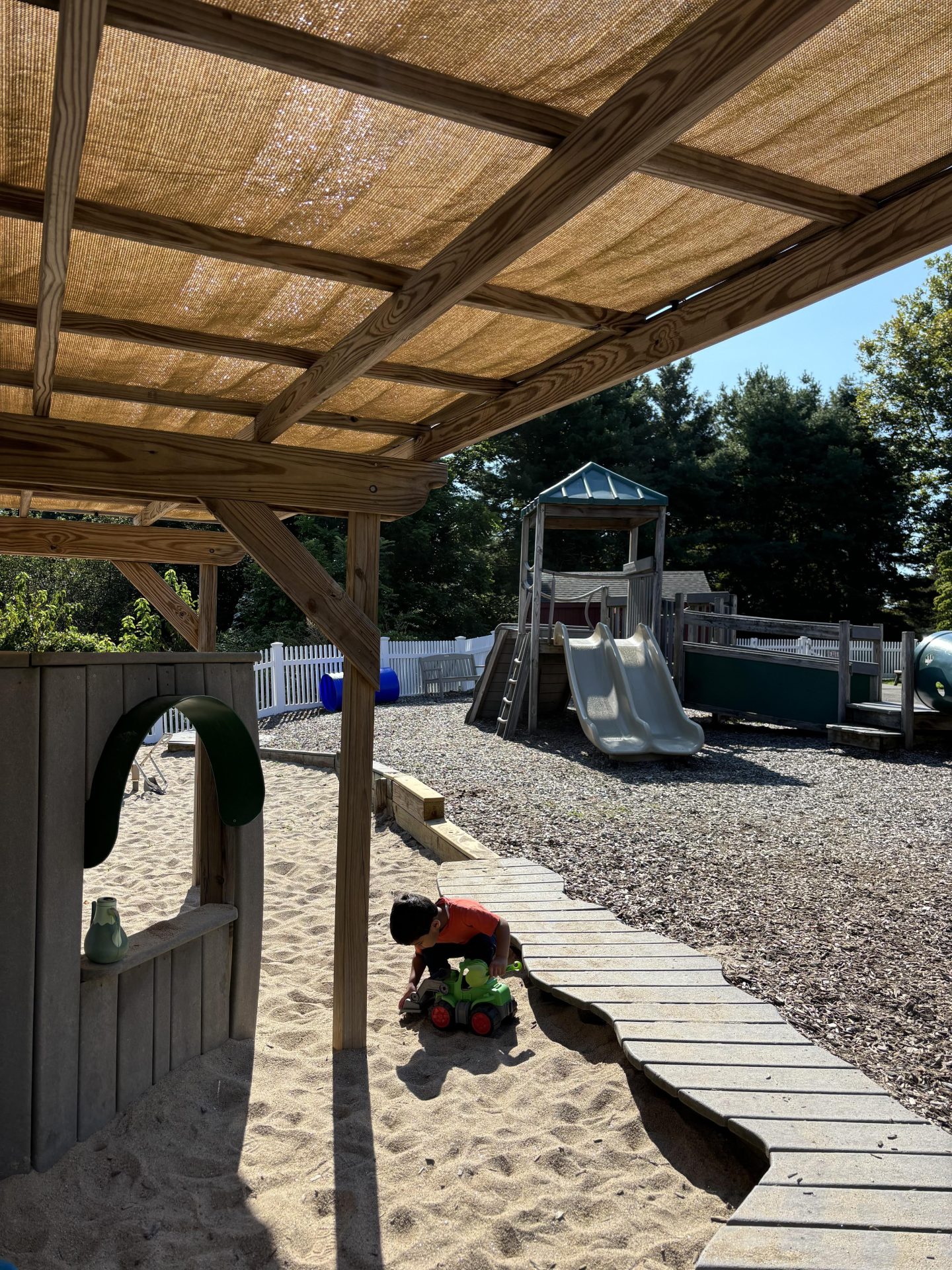
Cobb Montessori’s YCC classrooms are lovingly designed to nurture independence, exploration, and a love of learning in our youngest students. Classrooms are bathed in natural light from large windows that invite the beauty of the outdoors inside, creating warm, open spaces that feels both peaceful and engaging. Each YCC classroom integrates an indoor-outdoor experience with direct access to a private garden, where children can freely explore nature, tend to plants, and develop a respect for living things.
Low, accessible shelves hold hands-on materials that foster early self-care skills, language, movement, and sensory experiences, all carefully curated to meet the unique developmental needs of toddlers. This serene, thoughtfully arranged space reflects Montessori’s belief that the environment should be a “prepared place,” inviting children to explore, discover, and grow at their own pace.
How is the classroom environment set up to support Montessori learning?
The YCC classroom is a carefully prepared environment with child-sized furniture, low shelves, and materials that are within reach, allowing children to independently select and return activities. Large windows provide natural light, and each classroom has an adjoining garden that encourages children to connect with nature. Every aspect of the room is designed to be inviting, functional, and developmentally appropriate, allowing children to move freely and engage deeply in their activities.
How does the indoor-outdoor environment benefit my child?
Our YCC classrooms each have an adjoining garden space, allowing children to move between indoor and outdoor learning environments. This connection to nature fosters a sense of wonder and responsibility as children explore and care for plants, observe animals, and experience the natural world firsthand.
“Watching our child grow in independence and confidence has been a joy.”
“Our experience with the Young Children’s Community at Cobb School Montessori has been nothing short of amazing. Watching our child grow in independence and confidence has been a joy. Within a few weeks, they were excitedly putting on their own shoes and eagerly getting ready for school each morning. The warm, caring environment created by the teachers helped them feel truly at home, and they came to see their classroom as a place of comfort and discovery. It’s clear how much the teachers love and respect each child, fostering a beautiful sense of belonging and trust. We couldn’t have asked for a better start to our child’s education, and we’re so grateful for the foundation they received in YCC.” – Current YCC Parent
Parent Resources
We understand that parents of young children are eager to learn about and support the Montessori journey at home. To help, we’ve curated a selection of resources that offer insights into the Montessori approach for toddlers and ways to apply these principles outside the classroom:
Books on Montessori
- The Joyful Child: Montessori, Global Wisdom for Birth to Three by Susan Stephenson – An engaging introduction to Montessori for parents, this book covers the philosophy and practical activities to support young children.
- Montessori from the Start: The Child at Home, from Birth to Age Three by Paula Polk Lillard and Lynn Lillard Jessen – A guide to bringing Montessori principles into the home environment.
- How to Raise an Amazing Child the Montessori Way by Tim Seldin – A well-illustrated book with practical ideas and activities that can help parents create a Montessori-inspired home.
Blogs and Websites on Montessori
-
- Aid to Life – An initiative by the Association Montessori Internationale (AMI), this website provides straightforward advice on supporting children’s development from birth to three.
- Montessori Northwest Blog – Offers articles on the Montessori approach and advice for parents of toddlers.
- The Kavanaugh Report – A blog by a Montessori mom, sharing practical tips and activities for creating a Montessori-inspired home.
Videos on Montessori
- Montessori Guide – A collection of videos by AMI that demonstrate Montessori classrooms and activities, giving parents insight into what their child is experiencing at school.
- Montessori in the Home for Toddlers (YouTube) – Short, informative videos on setting up Montessori-friendly spaces at home, often by experienced Montessori guides or parents.
Community Support
We encourage parents to join our Montessori Parent Education Nights, where you can learn directly from our guides, ask questions, and connect with other parents on a similar journey.

